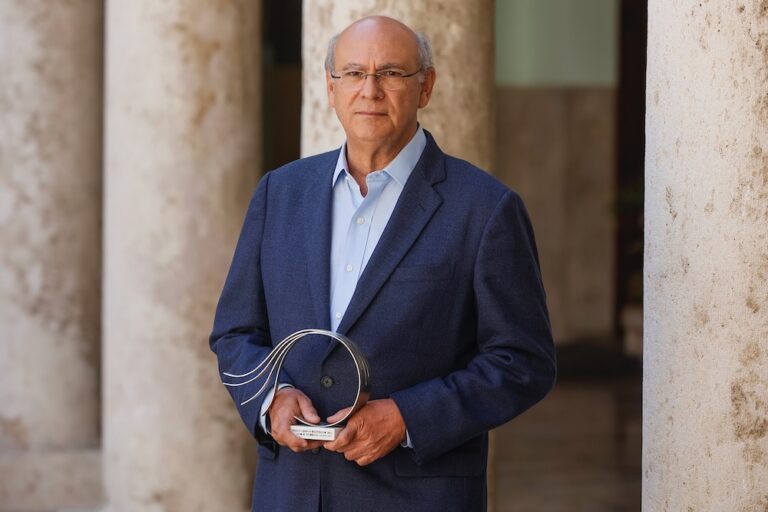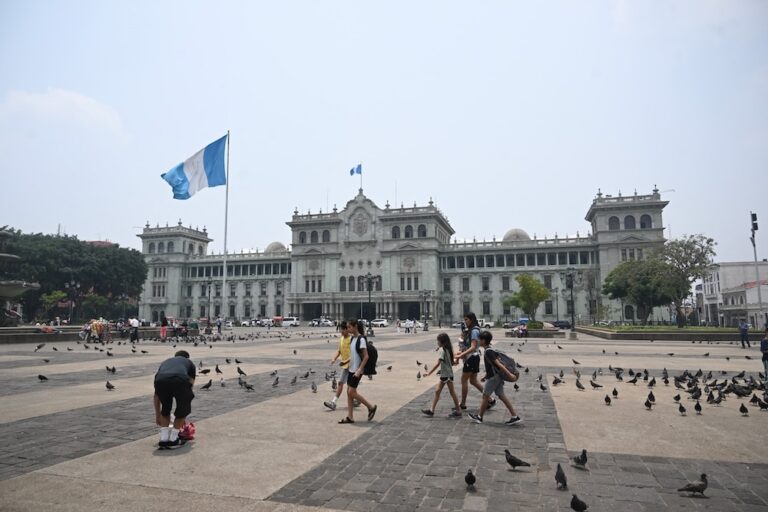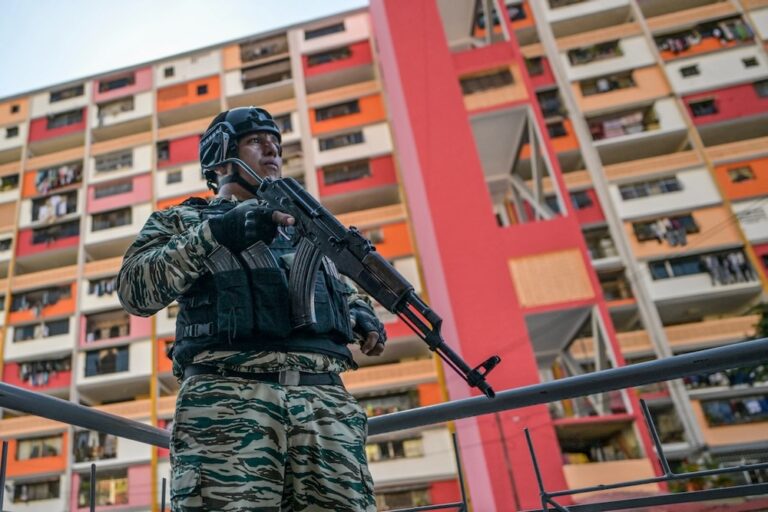September in the Americas: A free expression round up produced by IFEX's Regional Editor Paula Martins, based on IFEX member reports and news from the region.
The accumulation of years of anger
In early September, a video circulated on the internet showing members of the Colombian police forces repeatedly shocking a man with a stun gun when he was already defenseless on the ground. The man – Javier Ordóñez – died in custody after a couple of hours. A day later, protests erupted throughout Bogotá. Police stations were wrecked and officers responded with brutality that led to the death of more than 10 people and more than 400 were hurt, of which 66 reportedly presented bullet injuries.
In its 2019 report on protests, the Inter-American Commission on Human Rights recognized that the abusive use of force is one of the most common violations to the right to protest in the region.
IFEX-ALC Colombian member Fundación para la Libertad de Prensa (FLIP) documented 33 press freedom violations between 9 – 21 September 2020. Most of them referred to physical attacks, but arbitrary detentions and obstructions to the coverage of protests were also registered.
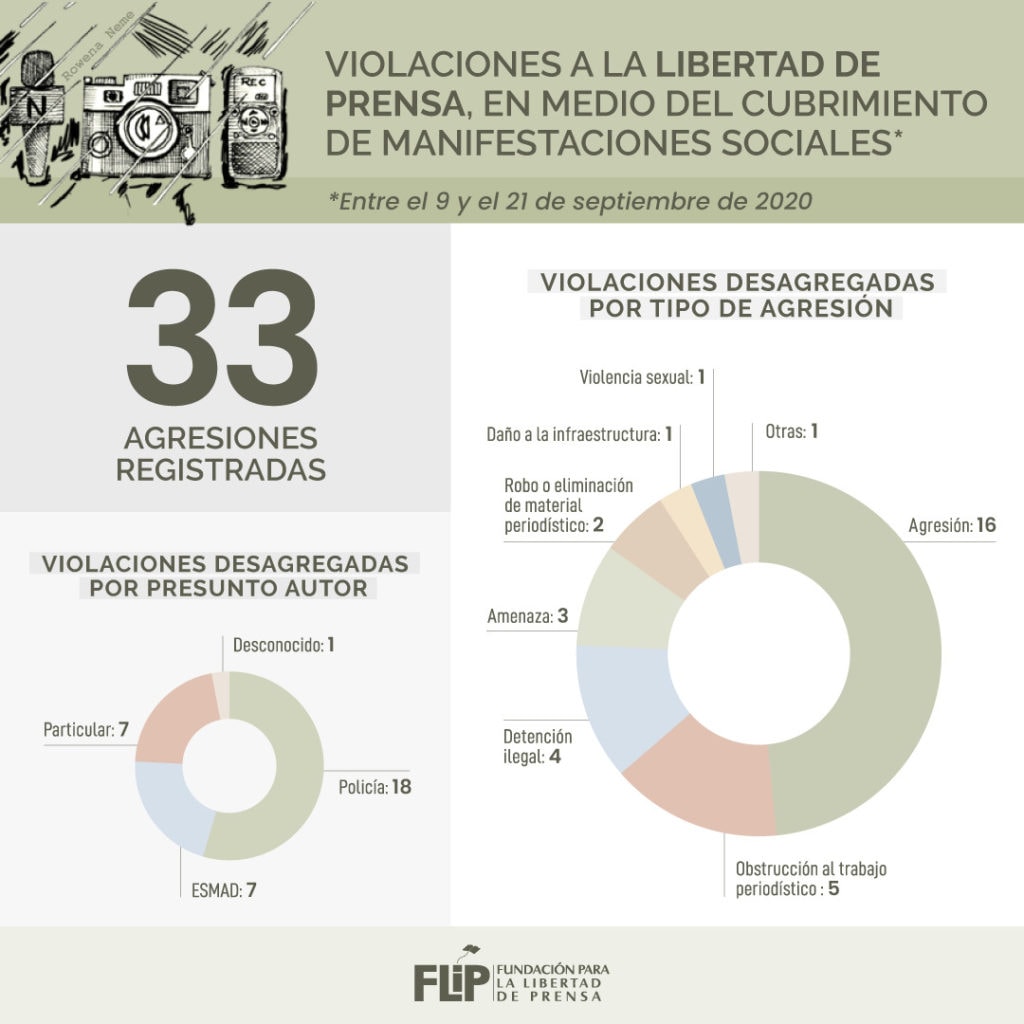
These violations took place the same month UNESCO released a new report – Safety of Journalists Covering Protests – Preserving Freedom of the Press During Times of Civil Unrest – stating that between January and June this year, journalists have been increasingly attacked, arrested and even killed while working on the coverage of public demonstrations.
According to the report, journalists face a wide range of abuses when covering protests, from harassment, intimidation and beatings, to being shot at with lethal or non-lethal ammunition, detention and abduction. Among the recommendations of the report is the strengthening of training for police and law enforcement on freedom of expression and appropriate behaviour in dealing with the media.
In its 2019 report on protests, the Inter-American Commission on Human Rights (IACHR) recognized that the abusive use of force is one of the most common violations to the right to protest in the region. This report also contains specific recommendations directed to the public agencies and forces in charge of public security for the handling of demonstrations.
Arguably, therefore, lack of standards stating what is ‘expected police behaviour’ during demonstrations is not the problem. The issue is lack of political will and commitment to implement the needed structural changes.
In the case of Colombia – as seen in other countries in the Americas – police forces crack down on protesters demonstrating against… police forces. It would be ironic if it weren’t deeply concerning. It is disturbing to think that law enforcement officers in democratic, rule-of-law-abiding societies, can act with such violence against its citizens. But these are societies, and police forces, seriously contaminated by racism, discrimination, corruption and a militarized mentality.
Some argue that many of the problems faced by police forces in different countries in the region are so rooted in the DNA of these institutions that no reform project would bring real change. And while no change comes, more violence is to be expected.
This is especially problematic when we look at the current context – the economic crisis anticipated for the upcoming months has been said to be the worst in Latin America’s history. If protests were a growing trend in the region before COVID-19, the health crisis and its broader socio-economic impacts will certainly exacerbate inequality and other social problems that are at the root of protests in the region.
When people are not being heard, they shout. If, when they shout, they are silenced with violence, anger continues to grow and accumulate.
How will our police and law enforcement authorities prepare for this?
Any solutions looking at the months to come need to concentrate on implementing the many standards and recommendations already out there. We can not say that there is lack of clarity in relation to what needs to be done. Doing it is an emergency.
Eliana Garzón, Javier Ordóñez’s sister-in-law, told journalists that Javier’s death was just the trigger, “the straw that broke the camel’s back”. The upheaval in Colombia represented, however, much more than that. It was an expression of “the accumulation of years of anger.”
Any long-term solution to police brutality against protesters also requires a holistic approach that looks beyond protests, and even beyond police forces. We need to seek answers to important questions: when people go to the streets to express themselves, why do they do it? Why aren’t they making their views and ideas explicit in other ways, in other spaces of public life? Are their demands being taken seriously? Is there plurality in representation in the public sphere?
One thing is certain – when people are not being heard, they shout. If, when they shout, they are silenced with violence, anger continues to grow and accumulate. Both the police forces and our societies in Latin America are in urgent need of structural change.
The information deserts of Venezuela
IPYS Venezuela is carrying out a study to trace a panorama of “news deserts” throughout Venezuela, based on the diagnosis and mapping of the national, regional and local media (print, television channels, radio stations and digital portals) that produce news about the reality of the 335 municipalities of the country.
In the first phase of the project, the results showed that 5,271,753 Venezuelans live in territories where not enough local information is produced. The border areas and indigenous communities were among the territories where more severe gaps in local information were found.
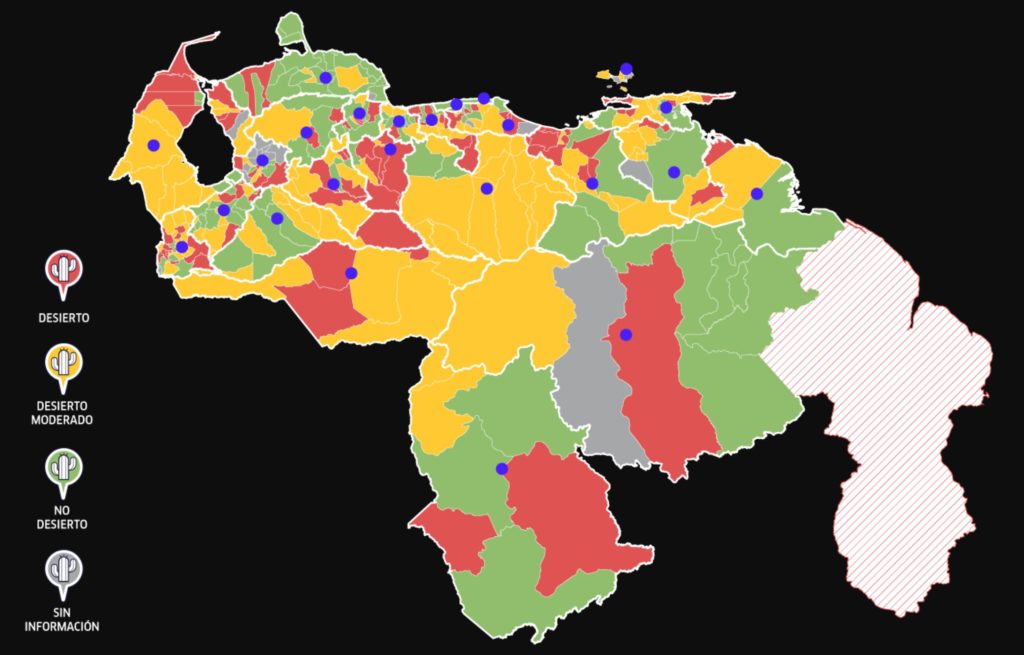
This is just a first glimpse of a study that is still under development by IPYS: the Atlas of Silence.
The Atlas of Silence is inspired by projects such as Cartografias de la Informacion, by FLIP, which carried out a mapping of the media outlets in Colombia, mainly in regions that have been areas of armed conflict. The research Atlas da noticia, by Projor (Institute for the Development of Journalism), an initiative to map news-producing media, especially local journalism, in Brazilian territory, was also a reference for IPYS’s Venezuela work.
Discrimination in the airwaves – indigenous peoples and community radio
In a very interesting case against Guatemala taken to the Inter-American Court of Human Rights by the Inter-American Commission, the Commission affirmed that the right of indigenous peoples to create community broadcasting media, and the enjoyment and exercise of the right to freedom of expression through access to a radio frequency, are protected under Article 13 of the American Convention.
In its report, the IACHR established that indigenous peoples in Guatemala are in a structural situation of social exclusion, discrimination and poverty, which is also manifested in their participation and representation in the media. The Commission highlighted that the General Telecommunications Law of Guatemala establishes ‘the highest bid’ as the only criterion for assigning frequencies, without taking into consideration that the indigenous communities lack economic resources and are not on equal terms to compete for radio frequencies with private bidders. This created a situation of de facto inequality.
The Commission concluded that, consequently, the Telecommunications Law discriminated against the four indigenous communities that were petitioners in the case, while at the same time violating the rights of the members of those communities to establish media outlets and express ideas, disseminate information, and their cultural worldview.
The IACHR considered that the existence of legal obstacles to accessing the radio spectrum prevented the indigenous peoples who were victims of the case from preserving, maintaining, and promoting their culture and indigenous languages, as well as the dissemination of their music and traditions, through community radio stations, which are essential tools for such purposes.
Cyberdelitos in Nicaragua
In late September, Deputies of the ruling Sandinista Front party presented a cybercrime bill to parliament that could allow for the criminalization of independent journalists and social media users. The proposal was presented under the name of “Special Law on Cybercrimes” and establishes 2 to 4 years in jail for publication of fake news.
The Foro de la Prensa Independiente de Nicaragua also called attention to article 25 of the bill which established prison sentences of 5 to 10 years for those who ‘reveal information classified as reserved’ and put at risk the ‘sovereign security of the State’ – for the group, this article seeks to curtail investigative journalism.
IFEX-ALC joined partner organizations in expressing serious apprehension with the text of the bill. According to the groups, the above mentioned provisions and other language inserted into the text of the bill lead to three main concerns:
- The vague and dubious definition of crimes in the bill may open the door to arbitrary application, especially given the heavy sanctions foreseen.
- The bill uses language that may be interpreted to facilitate censorship, allowing authorities to avoid public scrutiny and silence legitimate expressions, including criticism.
- It inhibits whistleblowing and scrutiny in the face of possible abusive and illegal acts by the authorities and private companies.
IFEX-ALC notes that ‘[t]he establishment of an arbitrary information control system is typical of authoritarian regimes’ and calls on the Nicaraguan Legislative to established an open and multi-stakeholder dialogue to discuss a cybercrime legislation that respects human rights and really contributes to the security of those who use ICTs in Nicaragua.
IFEX-ALC stands against disinformation

In late 2019, journalist Vanina Berghella wrote an article about the impact of disinformation during elections and other political events in Latin America for IFEX. In it, she emphasized that disinformation is not a new phenomenon. “The difference today,” she said, “is that easy access to digital platforms, large audiences eager for new content, the sophistication of certain methods of information generation, and a lack of digital education, complicate the process – not only with respect to detection of disinformation, but also its neutralisation. People are exposed to a huge amount of information, and can find it very difficult to determine where the news originates, its quality, and its overall characteristics – including whether it is truthful or accurate.”
In response to such a situation – which different members have faced in their work on the protection of freedom of expression and information in Latin America – IFEX-ALC launched a new campaign. The campaign marked this year’s International Day for Universal Access to Information (IDUAI), on 28 September.
In his op-ed for the campaign, IFEX-ALC’s Coordinating Committee president – Alejandro Delgado – recalled that “[w]hile disinformation has unfortunately been part of our lives in one form or another for a long time, the rise in the popularity and availability of social media platforms and messaging services like WhatsApp has allowed rumours to spread much faster to a much wider audience in a much shorter time”.
The campaign was built around the following recommendations:
- Be extra cautious of information that provokes strong emotions, even if it aligns with your own views
- Scrutinize the source of the information
- Share the information only after you have verified its accuracy
Check out the campaign videos, here and here.
Marking the Day, the IACHR Office of the Special Rapporteur on Freedom of Expression released a new report on The Right to Information and National Security. The report addresses the legal and de facto obstacles States in the region face when trying to balance the free flow of information of public interest and national security interests.
In Brief
ARTIGO 19 Brasil published a new report in mid September showing that public agents connected to the federal government were responsible for 449 freedom of expression violations within a period of 20 months. The documents documented the most common types of attacks during the administration of Jair Bolsonaro.
OBSERVACOM launched the campaign #TusDerechosEnInternet (#YourRightsInTheInternet) on content moderation in social media platforms.
ARTICLE 19 launched a report on the right to the truth in crimes against journalists. It tells the stories of the disappearance of Leodegario Aguilera and María Esther Aguilar, as well as the murders of Moisés Sánchez and Rafael Murúa. According to ARTICLE 19, “through four stories, this report covers two decades of violence against the press from different geographies, and shows us how the silence of journalists affects society.”

